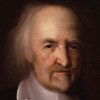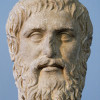“ force comes not near him, neither when he acts does he act by force. For all men in all things serve him of their own free will, and where there is voluntary agreement, there, as the laws which are the lords of the city say, is justice. And not only is he just but exceedingly temperate, for Temperance is the acknowledged ruler of the pleasures and desires, and no pleasure ever masters Love ”
Plato, Symposium. copy citation
| Author | Plato |
|---|---|
| Source | Symposium |
| Topic | justice pleasure |
| Date | |
| Language | English |
| Reference | |
| Note | Translated by Benjamin Jowett |
| Weblink | http://www.gutenberg.org/files/1600/1600-h/1600-h.htm |
Context
“and yet there remains much more which I might say. Of his virtue I have now to speak: his greatest glory is that he can neither do nor suffer wrong to or from any god or any man; for he suffers not by force if he suffers; force comes not near him, neither when he acts does he act by force. For all men in all things serve him of their own free will, and where there is voluntary agreement, there, as the laws which are the lords of the city say, is justice. And not only is he just but exceedingly temperate, for Temperance is the acknowledged ruler of the pleasures and desires, and no pleasure ever masters Love; he is their master and they are his servants; and if he conquers them he must be temperate indeed. As to courage, even the God of War is no match for him; he is the captive and Love is the lord, for love, the love of Aphrodite, masters him, as the tale runs;”
source



